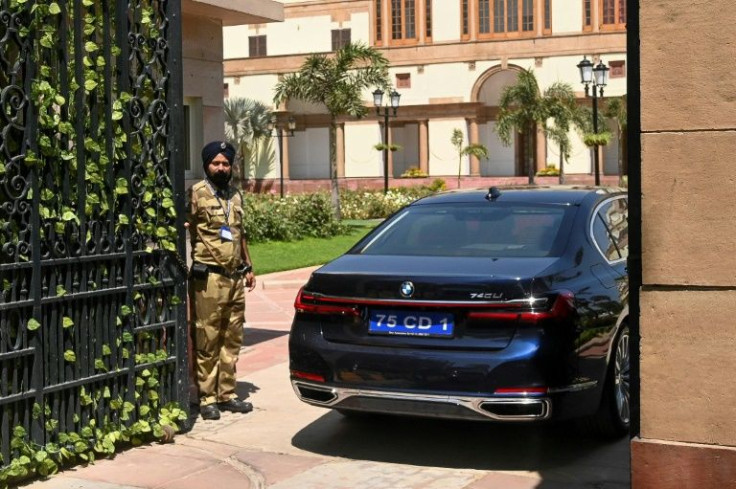India Defies Western Diktats Against Ties With Russia, Shores Up Rupee-Ruble Set Up

India has defied western diktats and chose to look for its own interests, despite the sanctions imposed by the U.S. and Europe on Russia for invading Ukraine, by seeking to set up a rupee-ruble payment system to trade with Russia.
India has already bought at least 13 million barrels of oil since Russia invaded Ukraine Feb. 24 compared with 16 million barrels for the whole of last year, giving scant regard to Western diktats, especially the U.S. pressure.
As the U.S. is trying to isolate Russia economically and financially, India bought Russia's flagship Urals grade at discounts of as much as $35 a barrel on prices. Given that oil prices have been rising since the invasion of the East European nation, India could save substantially from the deep Russian discounts.
Finance Minister Nirmala Sitharaman has confirmed that India has already secured crude oil supply from Russia at discounted prices. She said that India's decision was based on putting the country's "national interest" and "energy security" first. Cheap oil imports can help India to put a lid on the increased domestic discontent over high pump prices.
Russia has suggested using its System for Transfer of Financial Messages (SPFS), which it developed after the Crimea crisis in 2014, to move funds to deliberately bypass the Brussels-based SWIFT (Society for Worldwide Interbank Financial Telecommunication) network which has isolated Russia from the international financial network and has frozen Russian assets worth $1 trillion. No wonder why Russia no more trusts international currencies like the dollar and the euro.
Payment in rubles would increase demand for the currency and will help prop up its exchange rate. Russia is in dire need to shore up its financial system after western sanctions have squeezed it and its banks have been cut off from the international SWIFT payment system.
Under this rupee-ruble setup, a Russian bank has to open an account in an Indian bank while an Indian bank opens an account in Russia. The Russian currency will be converted into rupees at a specified exchange rate, and the money will be deposited into an Indian bank account.
India imports 86 percent of its oil requirements while getting only a tiny 2 percent from Russia. Currently, India's trade with Russia is largely skewed towards imports.
India imported nearly $9 billion worth of goods from Russia in 2021. Though the figure involved may be peanuts, it can boost the morale of Russian banks. The payment mechanism in local currencies will be used as a possibility for deeper engagement in the future.
Since India has to earn the rubles in order to pay for imports from Russia, it has opened up the scope for greater exports like pharmaceuticals, tea and textiles or meat, sugar, rice, and dairy products to Russia which, after all, requires these items and cannot currently import due to the sweeping sanctions.
Though many U.S. officials, including Under Secretary of State for Political Affairs Victoria Nuland and Daleep Singh, a top Indian-American U.S. advisor and a key architect of Washington's punitive sanctions against Moscow, pleaded with India to stay away from Russian imports during their trips to India last month, their pleas fell on the deaf ears of New Delhi while Russian foreign minister Sergey Lavrov, who arrived in India at the same time, got a patient hearing.
UK Foreign Secretary Liz Truss also visited India to plead for the U.S. cause, but India paid little heed when she suggested New Delhi stay away from Russia.
Another nation Russia banks on to tide over the sanctions is Germany. While Britain is planning to phase out buying Russian oil in a year's time, Germany is on a buying spree. Europe's largest economy gets 55 percent of its gas imports from Russia.
Germany has said the country will continue to pay for Russian gas in euros after Putin signed a decree threatening to enforce rouble payments from unfriendly countries. The new decree by Putin allows authorized banks to convert foreign currency in the payment process, as long as importers open a rouble account.
The German gas payments in euros would be converted into roubles by Russia's Gazprombank, which does not fall under the Western sanctions as the Russian energy sector is exempted from its purview.
Russia is insisting on payment in rubles for natural gas as current contacts with European nations demand payment in euros or dollars. European nations are much more dependent on Russian energy which makes up 40 percent of Europe's gas and 25 percent of its oil imports.
Russia has hinted at extending ruble payments to other commodities like metals and fertilizers. Revenues from energy have been accounting for 43 percent of the Russian government's revenue between 2011 and 2020, according to the U.S. Energy Information Administration.
Changing currency would normally follow extended negotiations, and European nations are not happy to be exposed to the uncertainties and fluctuations that come with paying in the less-stable ruble.
As European leaders have turned down the proposal Kremlin spokesman Dmitry Peskov has said the change won't happen immediately but by late April or even early May.
However, a top European Commission energy official tweeted that the EU was looking forward to "to establish a common approach."
If the world's 11th largest economy succeeds in bending sanctions by strengthening its currency with Indian and German gestures, the invasion of Ukraine will linger on, plaguing Europe and the U.S. for a longer time.
























